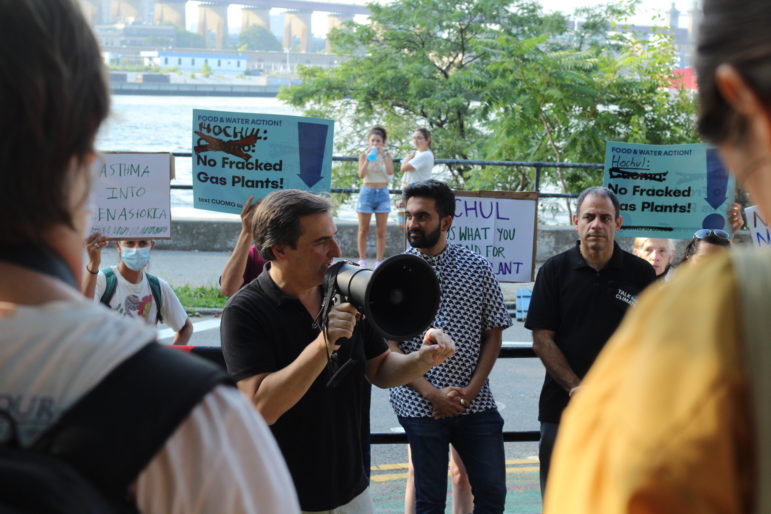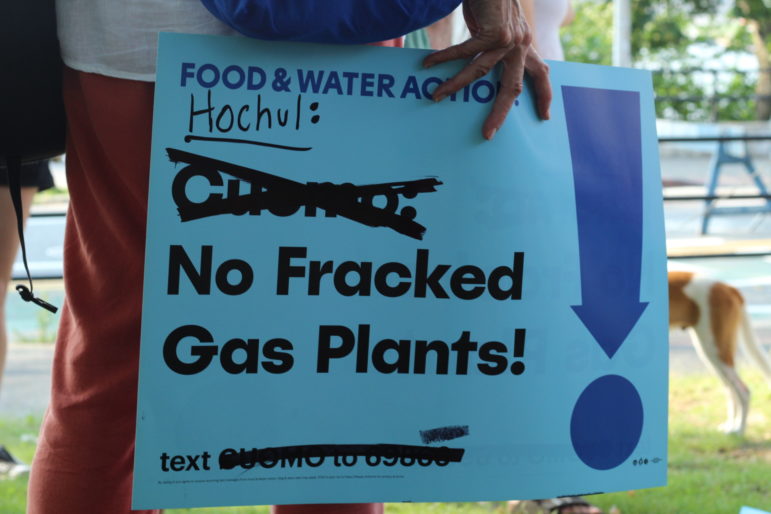The Department of Environmental Conservation won’t make a decision for several months, but says that as it stands, the project would interfere with limits on greenhouse gas emissions set by the CLCPA.

Liz Donovan
State Sen. Michael Gianaris speaks alongside Assemblymember Zohran Kwame Mamdani and former Astoria Councilman Costa Constantinides at a rally opposing the power plant Thursday.The state’s Department of Environmental Conservation (DEC) said that a proposed power plant in Astoria — which has inspired hours of public comments this week, mostly in opposition — is not in line with the state’s landmark climate legislation.
The proposal for the Astoria Gas Turbine Power Replacement Project, submitted by energy company NRG, would replace a 50-year-old high-polluting “peaker plant” with a more modern fracked-gas power plant that the company says can eventually run on renewable energy.
But environmentalists aren’t convinced the company will be willing or able to make the switch. At two days of public hearings this week, opponents argued that the project does not align with the Climate Leadership and Community Protection Act, which passed in 2019 and aims for New York State to reach 100 percent zero-emissions electricity by 2040.
Public comment is still open on the proposal for two and a half weeks, and the DEC won’t make a decision for several months. But the agency told City Limits that the project, as it stands, is not in line with the CLCPA.
“While sufficient information has been submitted to begin the required public review, DEC has determined the applicant has not demonstrated sufficient compliance with the requirements of the Climate Leadership and Community Protection Act, including requirements regarding greenhouse gas emissions,” a spokesperson for DEC said in a statement Thursday night.
To move forward, the proposed project would require a detailed justification and alternatives or greenhouse gas mitigation measures, according to the DEC.
NRG maintains that the company is committed to the state’s climate goals and that the plant would protect the city from grid overload and blackouts.
“As a company, we recognize the need to move to a zero-carbon grid as quickly as we can,” Tom Atkins, an NRG executive, told City Limits.
He says an independent report found the new plant would save five million tons of greenhouse gas emissions, or the equivalent of taking more than 90,000 cars off the road.
As of December the company had spent nearly $600,000 on lobbying for the power plant since 2019, according to a report by LittleSis, a project of the Public Accountability Initiative.
The proposed plant would be an alternative to a so-called “peaker” plant from the 1970s. Notorious for emitting high levels of harmful pollutants, peaker plants run infrequently, when the city reaches peak energy use, such as on extremely cold or hot days. Even with only occasional use, the plants can account for more than 10 percent of nitric oxide emissions when they run, according to nonprofit Clean Energy Group.
“The project is so much more efficient than what exists today,” Atkins added. “It would become the most efficient natural gas-fired peaking project in the state.”
The company proposes it will eventually use “green hydrogen,” which involves producing hydrogen through the electrolysis of water from renewable energy, like solar and wind power, rather than through the process of steam-methane reforming, which uses fossil fuels.
Atkins noted that President Joe Biden allocated funding in the federal infrastructure bill to research this technology, which is also being explored in the European Union.
But environmentalists aren’t convinced it will be ready in time for NRG to meet the 2040 carbon net-zero deadline set by the CLCPA — and it’ll be using dirty energy in the meantime.
“The problem is that technology isn’t in use or existing yet,” said Laura Shindell, of Food and Water Watch, a nonprofit that opposes the project. “So they’re holding on to this unicorn fantasy of transitioning the plant to renewable energy when there’s nothing solid about that plan at all, and they will want us to just trust them and say, ‘okay, build it anyway.’”
In the company’s proposal, it notes that an alternative option to immediately use green hydrogen “is not technically feasible because currently there are no commercially available sources of either green hydrogen or [renewable natural gas].”

Liz Donovan
A protestor holds a sign at a rally opposing the NRG power plant proposal in Astoria on Thursday.An NRG spokesperson referenced a poll that showed 78 percent of more than 1,200 New Yorkers supported the project, which it described to respondents as a proposal “to replace the 50-year-old power generators with newer and cleaner technology at no cost to taxpayers.” When provided with more information, support dropped only slightly to 73 percent, the poll showed.
But in the more than two hours of public testimony Thursday night, only a handful of about 77 commenters who had registered to speak said they supported the project.
Those supporters included Queens Chamber of Commerce President Thomas Grech and Gary LaBarbera, president of the Building and Construction Trades Council of Greater New York, who both cited the union jobs the project would create (1,000 jobs during its two years of construction and 73 jobs per year after that to operate the site, NRG says).
Opposition included U.S. Senate Majority Leader Chuck Schumer and other legislators.
On Tuesday, Schumer opened the first public comment session, saying that he “unequivocally” opposes the gas plant. “To move forward with this proposal would break the promise New Yorkers made to each other by passing the CLCPA,” he said.
State Senate Deputy Majority Leader Michael Gianaris also submitted testimony opposing the project and spoke out against it at a rally Thursday night on the banks of the East River in Astoria.
In March, nine legislators, including Rep. Carolyn Maloney, who represents the district, and Green New Deal co-sponsor Rep. Alexandria Ocasio-Cortez, sent a letter to recently resigned Gov. Andrew Cuomo and the DEC opposing the project, citing the link between respiratory illness of individuals living near plants and susceptibility to COVID-19.
“At a time when our focus should be on increasing public health outcomes, the addition of a new fossil fuel burning plant does the exact opposite,” the letter said.
Both Maloney and Ocasio-Cortez also participated in a roundtable discussion Thursday morning about peaker plants in Astoria.
The project comes at a time of transition for the state, as Gov. Kathy Hochul was sworn into office just this week.
Environmentalists are closely watching how Hochul will handle proposals by major energy companies, just days after she sparked criticism by environmental groups for not mentioning climate action as a priority in her first state address on Tuesday.
“The governor faces several urgent decisions on climate change, with the state holding public hearings on two fracked gas power plants just this week,” said Alex Beauchamp, of Food and Water Watch, in a statement following Hochul’s speech.
It’s also the second test of how legislators will enforce the CLCPA when considering proposals by energy companies that still use fossil fuels.
Earlier this month, the state’s Department of Public Service unanimously approved a rate hike associated with National Grid’s controversial North Brooklyn Pipeline Project that advocates and legislators, including Senate Majority Leader Chuck Shumer, said was in direct defiance of the CLCPA.
The state is accepting public comment on the project until Sept. 13 at comment.nrgastoriagas@dec.ny.gov.










One thought on “Proposed Astoria Power Plant Inconsistent With NY Climate Law, State Says”
Ravenswood was once a proposal for CLEANEST SAFEST NUCLEAR POWER BUT CORRUPT CUOMOSEXUAL POLS == AOC REPLACEMENT OF SCHUMER HATE NUCLEAR LOVE FOSSIL FUEL GREED NOT GREEN PROFIT$$$